|
Please click on the photos below to see
full-size views of the art sticks.
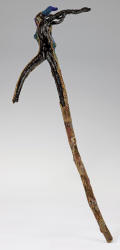 |
Diviner's Rod, by NanC Meinhardt.
Do you see the back of a
woman dancing? (click on photos to enlarge)
|
|
|
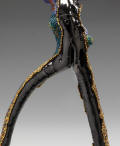 |
Close-up of Diviner's
Rod.
|
|
|
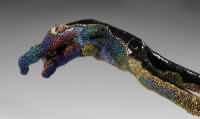 |
Turn Diviner's
Rod on its side. Do you see a sea creature?
|
|
|
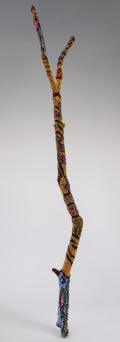 |
Bird with Antlers,
by NanC Meinhardt
|
|
|
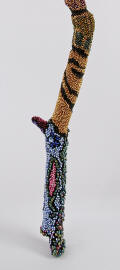 |
Close-up of
Bird with Antlers
|
|
|
 |
Turn the piece
upside-down, and it becomes Bird with Attitude
|
|
|
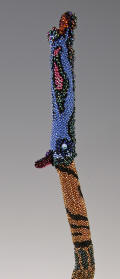 |
Close-up of
Bird with Attitude
|
Photos by
Martin Konopacki
Website design by
SnoozLooz
|
Workshop
Art Sticks: I'm Not an
Artist. I Can't Draw. I Can Only Draw Stick Figures
What do you see when you look at a stick? Find a wood stick
that "speaks to you," and bring it along with your favorite seed bead
colors, acrylic paint, markers, and any other art materials you enjoy.
You will use free-form right-angle weave (and your imagination)
to create a sticks of personal meaning. You will create your art
stick by expressing what you see.
Scheduling: three- to seven-day workshop.
See
materials & supply list.
Skill level: Advanced
Participants must be able to do off-loom, right-angle weave.
Familiarity with whittling, carving, and/or use of Dremel tool
is a plus.
Location: NanC's
home studio in Highland Park, IL (map)
Description
We each perceive objects in our own way. Art Sticks is a
workshop about seeing and then crafting what you see into a
personal stick.
Find a wood stick that “speaks to you,” and bring it to the
workshop. For a four-day workshop, this stick may be any size
or shape up to 10” long. It should be sturdy enough to embellish.
Give yourself time to become
familiar with it, as that knowledge may spark ideas for
additional supplies to bring from home.
Find a stick with
unusual features, such as the shape or how it bends, twists,
splits, branches off, etc. You may perceive a human or animal
figure. Better yet, look for a stick that looks interesting
facets—when you turn it you see something different. You may
even be drawn to a root.
The general supply list
includes beading supplies, acrylic paints, brushes, markers, and
other art materials you might enjoy using. This supply
list is really more a list of suggestions than a list of
items you must have at the workshop. I do ask you to bring
drawing and painting supplies, although you do not need to know
how to draw to create your Art Stick.
As an experiential workshop, each participant will approach
making their Art Stick in individual ways, according to your
interpretation of what you see. The basic method will be a
combination of whittling, carving, or use of
a Dremel tool; and applying paint, markers
(other art materials), and beading, using free-form right-angle
weave to create sticks with personal meaning. You might become
involved in the overall shape of your stick or find interest in
only part of it. You might wish to take the bark off the stick
to lay bare its hidden secrets of grain and knots, you might be
attracted to the texture—how the stick feels in your hand.
Finding meaning in each stick is similar to lying on your back
and looking up at the clouds. There is much to see. What you see
in your stick is the place to begin.
The prerequisite for this workshop, knowledge of the off-loom
bead weaving technique, right-angle weave, is mandatory!
Basic right-angle weave forms the foundation for the additional
beading techniques taught in the class. I will teach an
adaptation of right-angle weave in order to use this technique
in a free-form manner. This adaptation includes increasing,
decreasing, the use of a “filler bead,” and the use of a “filler
bead inside increase.” You will also learn to mix number,
shapes, and sizes of beads. I will teach further adaptations in
order to stretch the technique beyond your expectations. I will
also teach about bead placement within the patterning of
free-form right-angle weave to achieve as much accuracy in your
design as you desire. Using free-form right-angle weave with
size 15 seed beads will provide the highest degree of detail.
You will also learn methods to keep your beadwork tight against
the surface of your stick.
While beading is the main technique for creating your stick,
you may also use paint and markers to define your
vision and embellish your stick. You can apply paint and markers
as an under-coat for the beadwork or as a primary surface. The
use of found objects, wire, and fiber
will be addressed as well as many other variations. I will also
address shaping and carving the stick with a pocket knife
and a Dremel tool.
The creative process is a central theme of this
workshop. You may want to keep a journal reflecting your own process as you progress with
your project. Each day will begin with a short discussion of your creative process.
Please feel free to
contact me if you have questions or would like to further
discuss any aspect of the workshop. I look forward to seeing you
in class.
© 2010 NanC Meinhardt Studio LLC

Highland Park is about 20 miles north of Chicago on Lake
Michigan. NanC's home is just east of Sheridan Road, north of
Lake-Cook Rd.
|